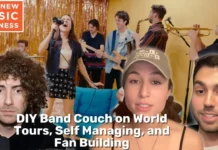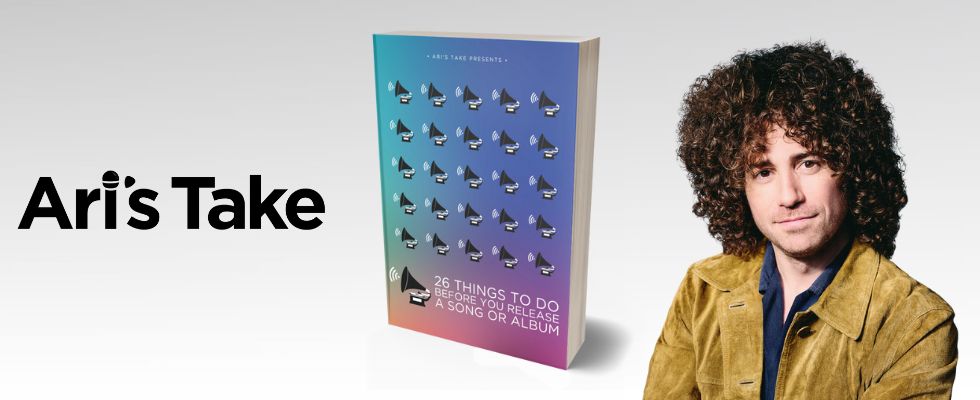Over the course of my career I’ve played over 1,000 shows ranging from living rooms to arenas.
And everywhere in between.
House concerts have remained some of my favorite shows I’ve ever played. There’s an intimacy and deep connection that you can only get in these types of environments.
House concerts oftentimes are far more enjoyable to play (and attend) than clubs. No angry bouncer giving you a hard time at the door. No overpriced drinks at the bar. No site line issues. No shitty deals from the promoter or talent buyer. No merch cuts with the venue (vomit). No promoter trying to shake the artists down for every last penny with “haze fee,” “towels fee,” “house nut” or what have you.
+What the Touring Landscape Looks Like Post-Pandemic
The hosts of house shows are not hardened club owners needing to make rent. They are usually music lovers and huge fans of the artist they’re hosting.
And not only are house concerts fun to play, they can be quite lucrative.
I’ve made more money playing a house show for 35 people than I have playing a club for 150. For one, you typically don’t have to share the ticket revenue with the host. And because people have just had a once in a lifetime, intimate experience they are willing to buy ALL your merch. Whereas artists typically make around $3.65 per head in merch for club shows (says AtVenu), I made around $20+ per head in merch for house concerts.
+Club Booking, Opening Slots, Deal Breakdowns with Brooklyn Bowl Talent Buyer
Over the years many companies have tried to tackle house concerts and make them more efficient. Some have succeeded (Concerts in Your Home) and some have failed (Fanswell).
Side Door is the latest company to tackle the house concert landscape and best positioned for healthy disruption.
Started by Juno Award winning singer/songwriter Dan Mangan and music industry professional (and long-time house concert host), Laura Simpson, Side Door is streamlining the relationship between host and artist.
+House Concerts and Ticketed Livestreams with Side Door’s Dan Mangan
Side Door isn’t just for house concerts. It was officially launched in 2019, but of course, with the pandemic, it quickly pivoted to hosting livestreamed concerts. Now that the pandemic has ended and in-person concerts are back in full swing, Side Door is back on the path of its original mission: “connecting artists and hosts to book memorable shows in any space.”
Side Door now focuses on setting up shows in alternative venue spaces like art galleries, record stores, breweries, community centers, churches, in addition to, of course, people’s homes.
To date, Side Door has successfully facilitated over 2,100 shows for 7,600 artists earning those artists nearly $1.5 million.
The problem that Side Door currently looks to solve is connecting people who want to host concerts in their space with artists who want to be hosted. And streamlining the entire process.
Have they succeeded with this mission? Well, not yet.
The most attractive feature on the platform is your ability to post (what they call) a “show call.”
It’s where you make an event on the platform stating that you’re looking for someone to host you in a specific city. Every host in that city gets pinged with your show call and theoretically a host can message you (on platform) letting you know that they’d like to host you.

You can then work out all the details – date, time, ticket price, setup for the evening, sound/light needs, etc – and then officially schedule the concert.

If you choose to sell tickets on the platform, it’s a very seamless checkout process for the attendee. Side Door holds the money in escrow until the show, and then pays out the money to the host and artist (while keeping a commission and fees – more on this in a minute).

If you’re an agent or a manager, you can actually create multiple Artist profiles under the same account, which is super helpful, so you can theoretically post show calls for all of your artists from the same account.
As of now, you’re not able to make a show call for multiple artists. Meaning, if you’re touring with someone, you can’t make one show call for the both of you. Each of you would have to register your own Side Door account and make your own show call. Which is cumbersome and clunky especially if you’re attempting to route together and manage multiple messages that come in for the same show (from multiple accounts).
+Indie Band Played 50 States on $50 and Grossed $80K
Side Door Fees
How Side Door makes money is by taking a cut of the ticket cost. Side Door takes 10% of the face value ticket along with $2 on every ticket. In addition, Side Door covers the Performing Rights Organization (PRO) fees for every “venue” (which in the US Side Door keeps an additional 6.5% to cover those fees).
So, if your show is $25 here’s how the money is broken down if you agree to give your host 15% of sales.
The fan pays $28.27 ($25+$2 Side Door fee + 3.58% + .30 Stripe fee).
- $7.22 to Side Door (26%)
- $17.54 to Artist (62%)
- $3.51 to Host (12%)
Something that most people don’t think of when negotiating club deals are the ticketing fees.
The best kept secret in the live music space is that promoters and venues (!) get a solid cut of those darn ticketing fees.
A normal club show breakdown at a Live Nation venue using Ticketmaster where the band gets “70% of tix” looks something like this on a $25 ticket:
The fan pays $35.25 ($10.25 in total ticketing fees)
- $12.63 to the venue/promoter (36%)
- $5.13 to Ticketmaster (15%)
- $17.50 to Artist (50%)
So, in this scenario, you’re making almost the exact same amount as you did with Side Door.
Whereas an independent show with tickets on Eventbrite looks something like this for a $25 ticket:
The fan pays $28.52 ($25 + 3.7%+$1.79 Eventbrite fee + 2.9% processing fee)
- $3.52 to Eventbrite (12%)
- $25 to the Artist (88%)
In this scenario, you’re making quite a bit more running tickets through Eventbrite versus Side Door or Ticketmaster.
And as stated before, Side Door and virtually every traditional music venue covers the license fees for Performing Rights Organizations (PROs) like ASCAP, BMI, SESAC, SOCAN, etc. So no DIY venue has to worry that a PRO will come after them for a license. Those fees are baked into the cut.
Also worth noting, you don’t have to use Side Door for ticketing (but that’s how they make money). If you’d like to run the show with tips, you absolutely can work out the details on platform and the night of the show “pass the hat” and sell your merch.
Also, in my experience I’ve found hosts aren’t really doing it for the money.
They are happy to go a bit out of pocket (for snacks, cleaning fees, what have you) to be able to host a once in a lifetime experience for their friends and family.
But I understand Side Door is hoping to attract hosts who simply love live music to put on concerts in their space for artists they may not know.
Side Door’s perceived value is in its interconnectedness, customer support and community.
The issue is, there isn’t much community or interconnectedness just yet (at least not outside of Canada).
Just like we all know by this point “promoters” that book shows don’t really promote those shows (but they take their handsome cut anyway), I’m not sure Side Door’s fees are worth it as they are structured now.
I set up a show call for Los Angeles for April 1-9 just to see what would happen. After a few weeks (and posting it a couple times on my social media) I got 0 responses. Sure, I could double down and send out email blasts (where the majority of my audience is), but why would I do that to give up around 38% of the take?
Side Door was founded in Canada so the vast majority of hosts are in currently in Canada
When I have previously run house shows I worked out everything over email. I actually have a house concert booking email template in my book if you’re interested.
I do appreciate how organized Side Door is. Keeping all of the messages around the one show call is extremely helpful. Unless you’re an unbelievably organized person (or a booking agent) it is very challenging to keep all of the simultaneous booking emails straight – especially when multiple people request varying dates in various cities. Which brings me to my next point.
On Side Door, you are required to select a city for your show call and unable to put out a “general” call.

Like, if I just want to see where my fans are who would like to host me, there’s no way to do that on Side Door, currently. I have to guess what cities they may be in.
+$50K in 2 Months Playing Backyards And How They Did It with More Fatter
On a previous house concert tour, I put out a general request to my email list and socials that basically just asked if anyone would like to host a house concert for me. I got a ton of responses from people in podunksville – oftentimes hours outside of a major city. I would have never known to put their town in the show call and they probably wouldn’t have responded to a show call that was in a city hours from where they live.
But I’m happy to route a tour through their town. One night I’ll play a club in the city and the next night I’ll drive to their home in the country for the house show.
This should be a feature on Side Door.
Side Door is currently incentivizing artists (with $500/show guarantees on top of the cut of tix) to put up show calls to inspire more hosts to sign up to the platform so they build their host network – which is definitely needed everywhere outside of Canada right now.
You can take advantage of this by signing up here.
My recommendation to Side Door is to instead incentivize hosts to sign up and start booking shows in their space. Maybe they build out a network of host ambassadors in every region who find alternative venue spaces
Overall, I love the idea of Side Door. I trust and respect the co-founders. The fact that a successful, touring singer/songwriter started this platform is a huge selling point for me. I really want them to succeed.
Time will tell if they will.
Learn more about Side Door and signup here.


















